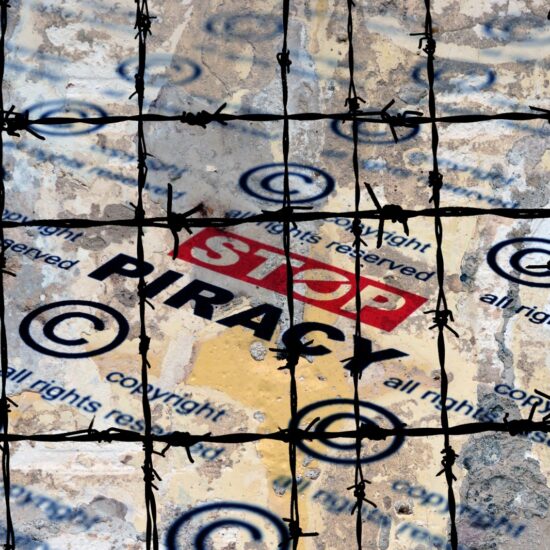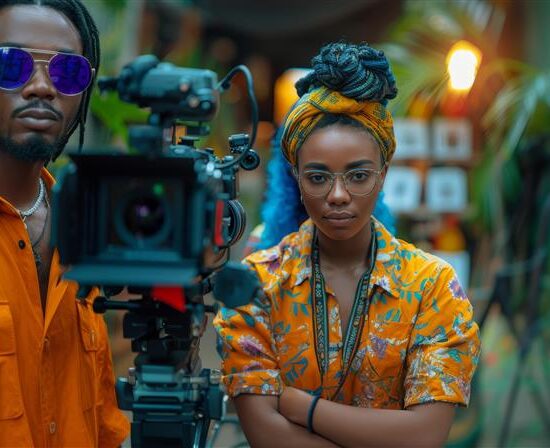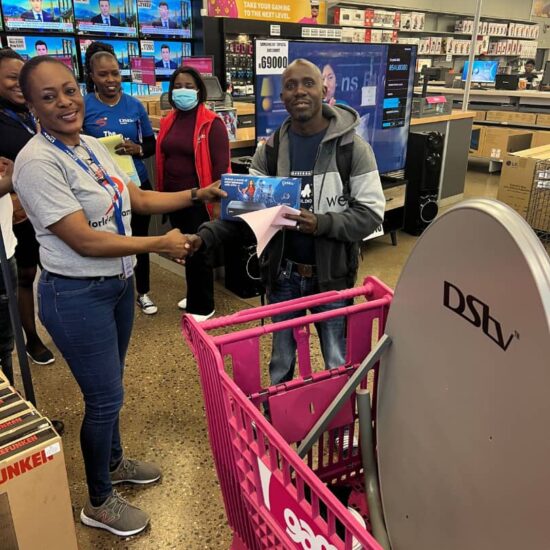
An old woman and a young maiden walk to the river to fetch water. The old woman
sits on the river bank while the young girl splashes in the water. “Tell me,
grandmother, about the time when you were young. What was it like?” she asks.
The old woman smiles and tells the young girl about how beautiful she was, how the
young hunters came to seek her hand in marriage and how her dowry was paid.
“There is so much more to a woman than physical beauty,” her grandmother tells
her, as they sink their clay pots into the river, filling them with water before beginning
the journey home.
This is what Zambian author, teacher, screenwriter and Mpali script writer, Tisa Phiri,
sees when you ask her what African storytelling means to her.
“I think that’s the kind of story that would have been transmitted between old and
young, while performing everyday tasks like the women and girls getting water or
preparing supper. These were opportunities for the elders to teach the youngsters
about their lived experiences, but also about their tribe’s history and heritage,” Phiri
explains.
A moral compass
As we celebrate Africa Month in May, the spotlight falls onto Africa’s tapestry of rich
cultural traditions, the backbone of which remains oral, singing and dancing
storytelling.
Phiri is among the African filmmakers trying to keep this custom alive through the
modern storytelling medium – film.
“Storytelling helps us transfer the wisdom from our elders, traditions, morals, ethics,
the ‘right thing to do’ and what is expected of us, onto the next generation. Today’s
parents are busy with work, so it’s rare to find people sitting down to inculcate this
knowledge to the young ones.
“My father was a very good storyteller, and would tell us stories after dinner. I was
eight years old, and can still remember the sound of his voice. He was so descriptive
in his storytelling that I could vividly see the story playing out in my mind as he
spoke. Most of the stories were life lessons. Sometimes they were scary, but I learnt
so much from them. Even now, when I recall his stories, I see the lessons in them,”
Phiri says.
Award-winning Malawian filmmaker, Shemu Joyah agrees, saying the childhood
stories his grandmother told him were so evocative that the lessons stayed with him
for years.
“When you’re a kid, you don’t realise it. But growing up and looking back you see
your grandmother was teaching you a lot about morality, how to behave, how to live
with others, how to treat other people. She used her imagination to tell us these
stories, and one day you realise that the hare, hyena or lion in the story is you or
someone you know. These stories stayed in the mind. You would remember them
long after hearing them. I would even go to school and tell my friends, “my
grandmother told me this story, listen here”. It was impactful,” Joyah recalls.
Storytelling still relevant
He believes traditional storytelling was a powerful medium for communicating
important issues while providing a moral and ethical fabric for society.
Dr Gopolang Ditlhokwa, film and television lecturer at the University of Botswana
agrees, says storytelling remains important to Africa’s cultures because it conveys
who we are.
“Africa has a culture that, despite centuries of disruption, has refused to be erased.
This culture has defined how we live, relate to one another, and make sense of the
world. Long before anything was written down, our histories, our knowledge, and our
values were carried in the voice of the storyteller. Even today, in many parts of the
continent, that voice still holds firm. We should be reminded of where we come from,
and in many ways, where we are going,” says Dr Ditlhokwa.
That is the enduring allure of African storytelling. Part lesson, part fact, part myth,
these stories bridge the past and the present, and in years gone by captured the
imagination of generations of children who, as adults today, still deeply appreciate
their wisdom.
A critical role
It is these same adults who see where the lack of storytelling in their cultures has
had a marked impact on how modern children are growing up today.
“When I see young people and how their morals are degrading, how disrespectful
they are, it really bothers me. Storytelling shaped us into the people we are today.
We should use this medium to continue telling our stories to the young ones to show
the traditions from our country, the morals we follow and the respect we have for
each other, ” says Phiri.
Joyah feels that it is only in retrospect that the older generation has become aware
of the critical role storytelling played. Beyond life lessons and societal expectations,
this intimate tradition provided a solid foundation on which previous generations
were built.
“Storytelling still has that role to play. There is still space for us to revisit it. And we
should, because once it’s lost, it’s lost forever. The stories that our grandmothers told
us also prepared us for the future – that is still relevant today. Perhaps the question
is ‘how do we package it in such a way that the youth will see value in it, especially
where indigenous language is concerned, instead of rushing off to social media?” he
explains.
Somebody who has seen this firsthand is Zimbabwean actor and director, Ben
Mahaka. Growing up in rural Mount Selinda with its abundant storytelling tradition
before moving to Ethiopia and later Europe and America, Mahaka returned to his
home village after 30 years and was struck by the loss of indigenous language.
“In 2018 I went back home and was acutely aware of how the language was being
diluted because locals were trying to mimic people from the big cities. It was a slow
process, but the uniqueness of the language was disappearing, and the people were
becoming part of this bigger, ill-defined thing. I decided to make a TV series in my
own dialect, Ndau, spoken as I remembered it when I was a kid,” Mahaka says.
That series was Gaza, a drama that used film to project indigenous language and
cultural identity to a wider audience. In doing so, Mahaka has preserved this part of
his culture for future generations.
Film as the modern storyteller
Phiri says this approach could well be the future of storytelling in Africa, as the youth
move from story books to digital devices.
“We should use this medium to tell our stories to both keep our customs alive and
also educate young people who might not have family or community to guide them in
the old ways. When we write an episode of Mpali that has a traditional angle to it, we
research that custom to make sure we get it right. Viewers can learn from that.
“For me personally, storytelling is about passion. I would love to use this platform to
transfer what I know and encourage elder people to transfer their knowledge.
Imagine a TV show where elders were invited to share their wisdom. If we put our
culture onto new video platforms, we give it new life. Children are curious and
actively watch videos on their phones. By putting our stories on those screens in
engaging ways, we expose the younger generation to their own heritage,” she says.
Therein lies the key to preserving storytelling as well as these stories – engagement.
Joyah believes animation perfectly translates African folk tales from grandmothers’
imaginations onto screens.
“In the beautiful world of my grandmother, the animals would speak. The lions, the
baboons, the crocodile, the snake…they all had different voices. She would change
the tone and speed of her voice to reflect the essence of that animal. When you look
at something like The Lion King with talking animals and lessons, you see the kind of
story my grandmother would tell. The Lion King is timeless, people still talk about it.
This is an avenue we could explore further with the youth in the future,” notes Joyah.
It’s the permanency of film that offers an opportunity for the oral stories of old to
become timeless tales in their own right.
“Film gives us something that oral tradition could never fully guarantee, and that is
continuity. In the past, stories, songs and histories lived in people. When a village
elder passed away, often so did the knowledge they carried. But with film, we have a
medium that can store and carry our cultural memories across generations. It stays,
and can be replayed, rewatched and reinterpreted. That’s what makes it powerful,”
says Dr Ditlhokwa.
Beyond animated children’s folk tales regrowing a grassroots connection to
indigenous wisdom, and modern-day dramas with culturally-themed episodes that
educate young adults, is the feature film that inspires all audiences, no matter the
age or geographical location.
Making African culture more accessible
This was most successfully demonstrated by the Black Panther movies, which –
although ‘Hollywoodised’ – are still largely heralded for shining a light on African
cultures and bringing this diversity to the big screen.
“Much of what film represents today is established on the stories that were once
passed down orally. However we still need both mediums. Oral tradition carries spirit,
rhythm, and cultural notes that film sometimes struggles to hold. At the same time,
film allows us to document, store, and share those stories across space and
generations. They belong to different times and serve different functions, but they
also feed into one another,” adds Dr Ditlhokwa.
While Marvel franchise films are not the answer to preserving Africa’s storytelling
tradition, they are a step in the right direction, making the continent’s cultures and
customs more accessible to wider audiences.
This provides a launchpad for Joyah’s folktale animations, Phiri’s elders’ wisdom
sharing show and Mahaka’s dramas in other indigenous languages that preserve
authentic African voices.
All this could just give birth to a new type of cultural influencer; one who is proud to
responsibly share their culture’s stories, fashion, customs and traditions on TikTok,
Instagram and YouTube, taking the legacy of our storytelling tradition well into the
future.




